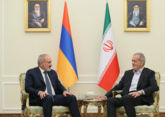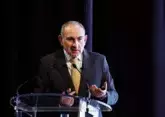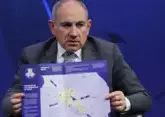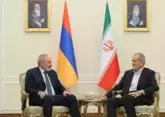Armenian Prime Minister Nikol Pashinyan announced his visit to Iran a month before arriving in Tehran. The visit was noteworthy because for the first time since Armenia's"velvet revolution,", its actual leader was received in Iran. Despite all the vicissitudes of domestic political life, Yerevan is closely following the events in Iran, which remains one of the important partners of Armenia. Taking into account Iran's difficult international position under the sanctions, Yerevan believes that the Armenian-Iranian relations should be considered in a wider context. Thus, Armenia continues to work towards overcoming the economic isolation caused by the Karabakh conflict.
Among the topics discussed in Tehran there were issues of updating bilateral relations, as well as the implementation of suspended projects. Yerevan has high hopes for the ratification of an agreement for the establishment of a free trade zone between Iran and the Eurasian Economic Union, which will open up new opportunities for increasing trade and enhancing business contacts. Against the background of complex political processes, Armenia's new leadership seeks to pursue a more transparent domestic economic policy, hoping to attract investments from the diaspora from around the world, in particular, to establish and strengthen trade relations between Armenian entrepreneurs of the Islamic Republic of Iran, which can significantly advance the development of infrastructure programs in the border region zone.
A large number of Iranian Armenians have dual citizenship and, while living in Armenia, they constantly keep in touch with Iran. Many of then are entrepreneurs, artisans, as well as small and medium-sized businessmen interested in establishing their own industries in Armenia. According to Armenian media reports, last year's trade turnover between the republics reached a record $363.6 million, which is 40.5% more than in 2017 and the highest figure since 1991.
At the end of the first day of his official visit to Tehran, Nikol Pashinyan held a meeting with the local Armenian community.
Tehran and Yerevan are also considering cooperation in tripartite and quadripartite formats. Armenia remains the only land link between Iran and the EEU countries. Tehran needs to improve its trade and transport links with Europe, and this may require the transit capabilities of Armenia, Georgia and Russia. The success of the quadripartite format provides Iran with access to the Black Sea ports, which will allow developing cooperation in the framework of the Iran-Caucasus-Europe axis. In such projects are implemented, Armenia's economic weight in the region may significantly increase and encourage new discussions on the long-standing project for the construction of the Tabriz-Megri pipeline, as well as the refinery in Meghri.
The Iranian leadership, most likely, expected some specific statements regarding the Karabakh settlement from the meeting with the Armenian Prime Minister. Tehran’s interest in resolving the conflict is simply explained. U.S. sanctions on Iran are supposed to prevent it from selling Iranian oil on the world market, and Tehran is seriously considering the prospect of blocking the Strait of Hormuz, through which 40% of the world's traded oil from the Persian Gulf passes. Therefore, if tension between the West and Iran increases, Tehran expects the situation in the South Caucasus to be as stable as possible, and the leaders of Armenia and Azerbaijan will adhere to the peaceful scenario of resolving the conflict. At the same time, the Iranian authorities are in favor of solving the Karabakh problem by attracting exclusively regional players without the participation of the United States and the European Union. Obviously, in that manner Tehran wants to verify the political orientation of Yerevan, since Sa'dabad has repeatedly suggested that the West had been behind the events in Armenia.
Finally, in advance of the next round of confrontation with the United States, it will be more difficult for Iran to attract international investors to implement its regional projects in the South Caucasus. Therefore, one of the goals of Pashinyan’s visit is to assure Tehran of Yerevan’s commitment to maintain strategic cooperation, despite the sanctions. Taking into account Azerbaijan's activity in the Iranian electric power market and Baku's desire to offer more favorable conditions within the framework of joint energy and transport and logistics projects, it is important for Yerevan to reach substantive agreements on joint economic projects.










